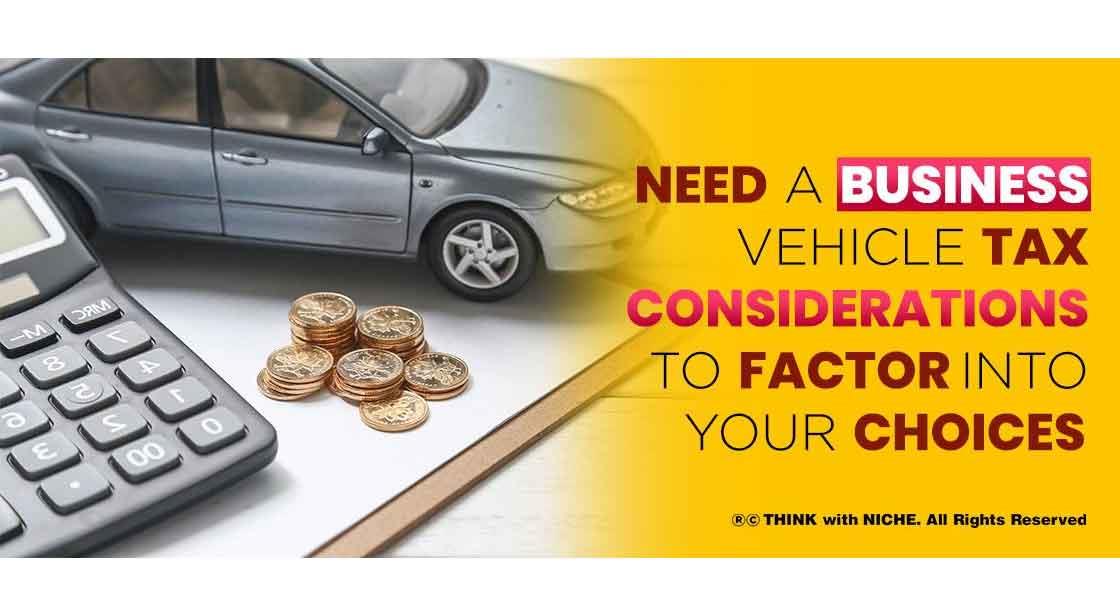Need A Business Vehicle Tax Considerations To Factor Into Your Choices

Blog Post
Are you on the verge of purchasing a car, truck, or van right now? Which is preferable, an electric or a hybrid vehicle? Do you wish to purchase or lease a vehicle? And, in any case, whose name is it (the owner or the company)? Factors like your company's requirements, fuel efficiency, financial position, and insurance cost will all have an impact on your selection. #ThinkWithNiche
Whatever choice you select, will have an impact on your taxes, which will have an impact on the rest of your finances. When looking for a new corporate vehicle, keep the following tax factors in mind.
Vehicles Equipped With Plug-In Electric Motors Are Eligible For A Tax Credit
Certain plug-in and charge-only vehicles are eligible for a federal tax credit (not a hybrid). A comparable discount is not available when leasing a plug-in electric drive vehicle. Until 2021, the maximum credit for a four-wheel car is $7,500 and $2,500 for a two-wheel vehicle. If the vehicle is solely used for business reasons, the whole amount of the credit is part of the general business credit. There is an annual limit on the total business income tax credits, and the amount currently claimed for the vehicle may be limited. Electrek has a comprehensive list of vehicles that qualify for the federal tax credit. Tesla and GM cars no longer qualify for any credit since the manufacturers sold more than 200,000 qualifying vehicles—the limit allowed under tax law. DSIRE gives a state-by-state overview of tax breaks for drivers of fuel-efficient vehicles. Keep an eye out for any new incentives for plug-in electric vehicles that may be included in forthcoming legislation.
At All Costs, Trade-Ins Should Be Avoided
You used to be able to deduct any profit from the purchase price of a new car if you traded in your old one for a new one.As a result, while no tax was due right away, future write-offs were reduced. You must now report the difference between the amount you receive (or are credited against your new vehicle) and the base price when you trade in your previous vehicle. The basis is your initial purchase price minus depreciation if you deduct the car's actual running expenses; otherwise, the basis is an anticipated depreciation allowance calculated using the IRS standard mileage rate. The estimated depreciation rate for business driving in 2021 will be 26 cents per mile, up from 27 cents per mile in 2020 and 26 cents per mile in 2019.
After deducting the business costs
If you own or lease the automobile, you can deduct your actual expenses, including depreciation, or you can utilise an IRS standard mileage rate (for example, 56 cents per mile in 2021). However, things are not as simple as they appear to be:
- Luxury automobile depreciation may be limited since its value changes from year to year. Because automobiles placed in service in 2021 are subject to an $18,200 depreciation cap (assuming bonus depreciation is used), the restriction would not apply until the vehicle costs more than $91,000; the cap for later years would apply to a vehicle costing far less.
- The Internal Revenue Service (IRS) announced cost limits for automobiles acquired and placed in service in 2021. (See Tables 1 and 2 for further information.)
- SUVs weighing more than 6,000 pounds are free from the aforementioned monetary limits and can be entirely depreciated in the year of purchase if bonus depreciation is applied to the purchase price.
- Non-personal use vehicles acquired and placed in service in 2021 may be fully depreciated using 100 percent bonus depreciation. Vehicles with no passengers other than the driver include flatbeds, dump trucks, and delivery trucks.
- When leasing a high-priced vehicle (e.g., one with a fair market value greater than $51,000 if leased in 2021), the "inclusion amount" reduces the deductible component of lease payments. Starting in 2021, the inclusion levels for vehicles are minimal, even for high-priced models.
- When purchasing a business vehicle, the amount of interest that may be deducted from your taxable income may be limited. Small businesses, on the other hand (those with average annual gross sales of less than $26 million in the previous three years) are exempt from this limitation.
Finally, keep in mind that your tastes may ultimately influence your choice of vehicle. Before making a final choice, consult with your CPA or another financial expert to see if there are any other options.
You May Like
EDITOR’S CHOICE












